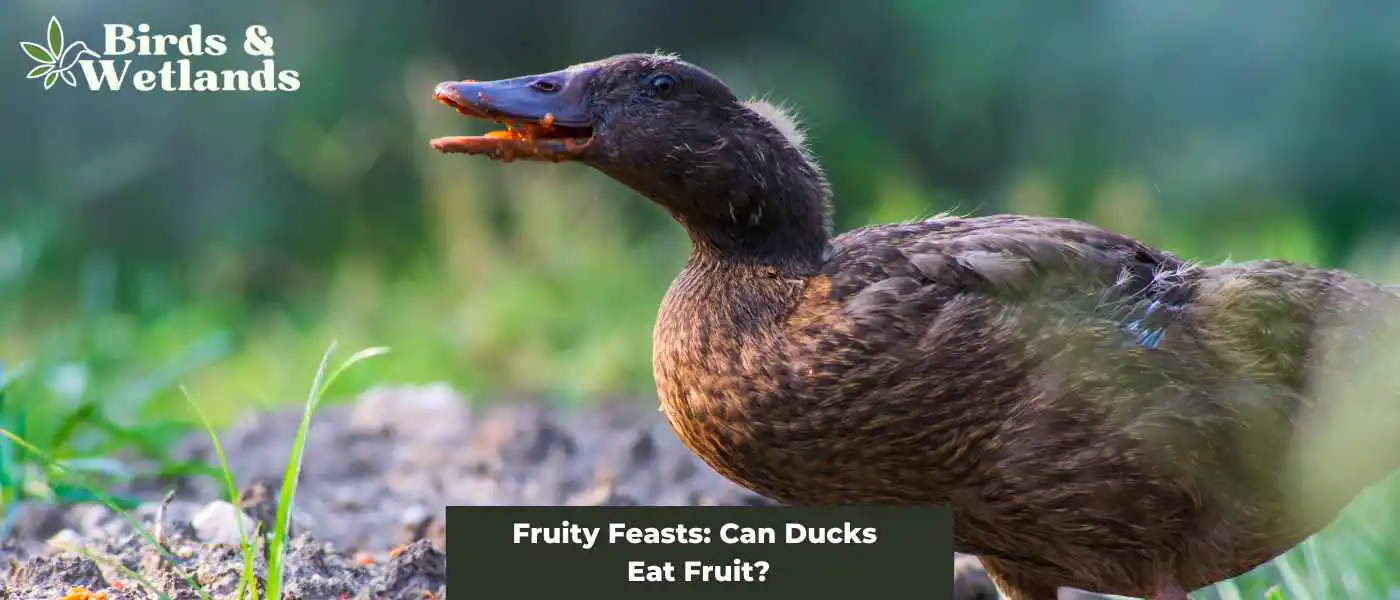Ducks love fruit, but can they safely eat fruit?
Yes, ducks can eat fruit, and many fruits can be a nutritious treat for them. Offer fruits like berries, seedless grapes, chopped apples, and melons in moderation as a supplement to their primary diet of high-quality commercial duck feed.
However, avoid feeding ducks fruit pits or seeds, as some can be toxic or pose a choking hazard. Always provide fresh, clean water alongside fruit treats.
Key Takeaways:
Ducks can eat fruit, which can be a nutritious treat in moderation
Offer berries, seedless grapes, chopped apples, and melons as supplements
Avoid feeding ducks fruit pits or seeds due to toxicity and choking risks
Best Fruits for Ducks
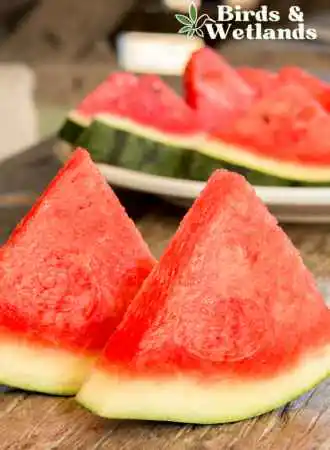
It is important to note that while ducks can eat fruit, it should only make up a small part of their diet. Ducks need a well-rounded diet consisting of diverse food sources, such as grains, seeds, and vegetables.
When feeding fruit to ducks, it is important to ensure that the fruit is fresh and free of any mold or rot. Fruit that has gone bad can cause digestive problems and make the duck sick.
While ducks can eat fruit, it is important to be mindful of what types of fruit are safe for them to consume. Fresh fruits such as strawberries, grapes, bananas, watermelon, and melon are safe for ducks to eat, while citrus fruits and fruits with large pits should be avoided.
Keep in mind that while these fruits can provide certain benefits to ducks, they should only be given in moderation as treats. Ducks require a well-balanced diet, primarily consisting of duck feed, to meet their nutritional needs. Fruits should not replace their main diet.
Best Fruits for Ducks
- Berries: Blueberries, strawberries, blackberries, and raspberries are excellent choices for ducks because they are rich in antioxidants, vitamins, and minerals. These nutrients can help support the ducks’ immune system and overall health. Additionally, the small size of berries makes them easy for ducks to consume.
- Grapes: Grapes are a great source of vitamins A, C, and K, as well as potassium and other essential minerals. They are also packed with natural sugars, providing ducks with a quick energy boost. Make sure to cut grapes into halves or quarters to reduce the risk of choking.
- Apples: Apples are rich in dietary fiber, vitamins, and minerals, which can contribute to a duck’s overall health. Be sure to remove the seeds before feeding apples to ducks, as they contain cyanide and can be harmful in large quantities.
- Bananas: Bananas are high in potassium, vitamin C, and other essential nutrients that can support a duck’s health. They are also soft and easy for ducks to eat, making them a popular choice for a duck-friendly fruit treat.
- Watermelon: Watermelon is not only a tasty treat for ducks, but it also provides hydration due to its high water content. Rich in vitamins A and C, as well as antioxidants, watermelon can help support a duck’s immune system. Remember to remove the seeds and rind before offering it to your ducks.
- Pears: Pears are another good option for ducks, as they are packed with vitamins, minerals, and dietary fiber. They can help support a duck’s digestive health and overall well-being. Cut pears into small pieces to make it easier for ducks to eat.
- Peaches: Peaches are a nutritious fruit option for ducks, containing vitamins A and C, as well as potassium and other essential nutrients. Remove the pit before feeding peaches to your ducks, as it can be a choking hazard.
- Plums: Plums are a good source of vitamins A and C, potassium, and dietary fiber. These nutrients can contribute to a duck’s overall health and support their immune system. Be sure to remove the pit before offering plums to your ducks.
It is important to note that ducks should not be fed too much fruit as it can be high in sugar.
| Apples | Can Ducks Munch on Apples? |
| Bananas | Are Bananas Good for Ducks? |
| Blueberries | Feeding Ducks Blueberries |
| Cantaloupe | Cantaloupe Treats for Ducks |
| Cherries | Can Ducks Enjoy Cherries? |
| Grapes | Are Grapes Safe for Ducks? |
| Lemons | Sour Citrus for Ducks? |
| Mango | Tropical Delight for Ducks |
| Oranges | Citrus Treats for Ducks |
| Peaches | Juicy Peaches for Ducks |
| Pears | Pears: A Duck’s Delight? |
| Strawberries | Strawberry Treats for Ducks |
| Tomatoes | Can Ducks Eat Tomatoes? |
| Watermelon | Refreshing Watermelon for Ducks |
Fruits to Avoid
Avocado
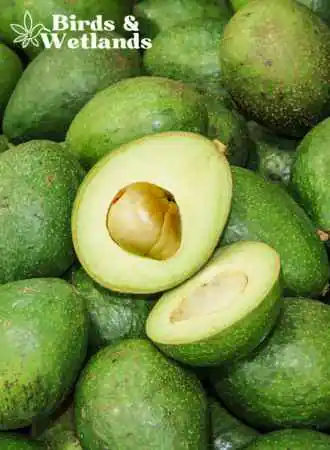
Avocados are a popular fruit among humans, but they can be harmful to ducks. The fruit contains a toxin called persin, which can lead to serious health problems for ducks, such as respiratory issues, heart failure, and even death.
While avocados are rich in nutrients that are beneficial for humans, they are not suitable for ducks. To ensure the health and well-being of your ducks, it is best to avoid feeding them avocados altogether.
Fruit Pits and Seeds
Many fruits contain pits and seeds that can be dangerous for ducks to consume. Some pits, such as those found in cherries, peaches, and plums, contain a compound called amygdalin. When ingested, amygdalin breaks down into hydrogen cyanide, a toxic substance that can cause respiratory distress, seizures, and even death in ducks.
Similarly, apple seeds also contain a small amount of amygdalin, making them unsafe for ducks as well.
To avoid these risks, always remove pits and seeds from fruits before feeding them to your ducks. Ensure that your ducks do not have access to fruit trees where they may inadvertently consume fallen fruit with pits or seeds.
| Fruits Ducks Can Eat | Foods Ducks Should Not Eat |
|---|---|
| Apple (core and seeds removed) | Avocado (toxic to ducks) |
| Grapes (halved or chopped) | Citrus fruits (too acidic) |
| Berries (strawberries, blueberries, raspberries) | Onion (can be harmful) |
| Banana (mashed or sliced) | Garlic (can be harmful) |
| Watermelon (seeds removed) | Chocolate (toxic to ducks) |
| Pear (core and seeds removed) | Caffeinated products (toxic) |
| Peach (pit removed) | Alcohol (toxic to ducks) |
| Plum (pit removed) | |
| Pineapple (core removed) | |
| Kiwi (peeled and chopped) |
Unripe or Overripe Fruits
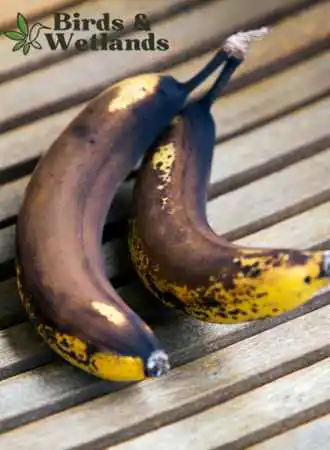
Unripe fruits, such as green tomatoes, can be harmful to ducks due to their high levels of solanine, a toxic alkaloid. Solanine can cause gastrointestinal distress, weakness, and even death in ducks if consumed in large quantities.
It is important to only feed ripe tomatoes to ducks, as the solanine content decreases as the fruit ripens.
Overripe fruits, on the other hand, can harbor harmful bacteria and fungi. Feeding overripe fruits to ducks can lead to foodborne illnesses and digestive issues. To ensure the safety of your ducks, always inspect fruits for signs of spoilage before offering them as treats.
Citrus Fruit and Ducks
Citrus fruits, such as oranges, lemons, and grapefruits, should be avoided when feeding ducks. These fruits contain high levels of acid, which can upset the duck’s digestive system and cause health problems.
Benefits of Fruits in a Duck’s Diet
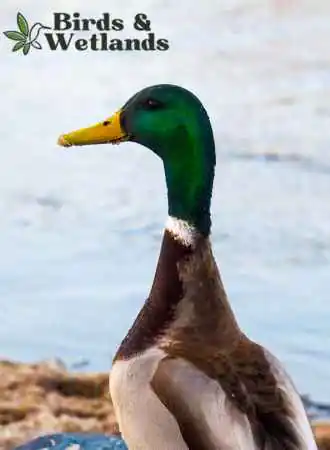
Fruits can be a valuable addition to a duck’s diet, providing a range of benefits that contribute to their overall health and well-being. They are a rich source of vitamins and minerals, which play an essential role in maintaining a duck’s immune system, bone health, and overall body function.
| Fruit | Benefits for Ducks |
|---|---|
| Apple (core and seeds removed) | Provides vitamins, minerals, and fiber |
| Grapes (halved or chopped) | Rich in antioxidants, vitamins, and minerals |
| Berries (strawberries, blueberries, raspberries) | High in antioxidants, vitamins, and fiber |
| Banana (mashed or sliced) | Good source of potassium, vitamins, and energy |
| Watermelon (seeds removed) | Hydrating and rich in vitamins A and C |
| Pear (core and seeds removed) | Good source of fiber and vitamins |
| Peach (pit removed) | Rich in vitamins A and C, and potassium |
| Plum (pit removed) | Provides vitamins A, C, and K, and fiber |
| Pineapple (core removed) | High in vitamin C and bromelain, an anti-inflammatory enzyme |
| Kiwi (peeled and chopped) | Excellent source of vitamin C and fiber |
Ducks enjoy fruits such as oranges (avoid too much citrus fruit) and berries are packed with vitamin C, which helps support the immune system and aids in the absorption of iron. Additionally, fruits like bananas and melons contain essential minerals like potassium and magnesium, which contribute to a duck’s electrolyte balance and muscle function.
Incorporating fruits in a duck’s diet can also be beneficial for their digestive system. Fruits contain dietary fiber, which aids in digestion and helps maintain regular bowel movements.
This is particularly important for ducks, as they often consume a diet consisting of grains and seeds, which can be low in fiber. By offering fruits as occasional treats and whole grains, you can help support you feathered friends digestive health.
Another advantage of feeding fruits to ducks is their high water content. Ducks require a sufficient amount of water for proper hydration, and fruits can serve as natural sources of hydration. This is particularly beneficial during hot summer months when ducks are at a higher risk of dehydration.
Lastly, fruits can add variety and enhance the flavor profile of a duck’s diet. Offering a diverse range of fruits can help stimulate a duck’s appetite and make their meals more enjoyable. This can be particularly beneficial for ducks that may be picky eaters or require encouragement to consume a balanced diet.
Best Duck Feed Pellets
Are you a duck owner looking for the perfect feed to keep your feathered friends happy and healthy? Look no further than Purina Duck Feed Pellets! With their nutritionally balanced formula and high-quality ingredients, these pellets are the ultimate solution for providing your ducks with the nutrition they need to thrive.
Pros
- Complete Nutrition: Purina Duck Feed Pellets are nutritionally balanced to provide all the essential vitamins and minerals that ducks need to stay healthy and strong.
- Easy to Digest: The pellets are specially formulated to be easy to digest, which makes them ideal for ducks of all ages.
- Promotes Growth and Development: With its balanced nutrition formula, Purina Duck Feed Pellets are designed to support healthy growth and development in ducks.
- Suitable for All Breeds: Whether you have domestic ducks or wild ducks, Purina Duck Feed Pellets are suitable for all breeds of ducks.
- Trusted Quality: Purina has been producing high-quality animal feed for over 100 years, so you can trust that your ducks are getting the best possible nutrition with Purina Duck Feed Pellets.
Cons
- Cost: Compared to other types of duck feed on the market, Purina Duck Feed Pellets can be slightly more expensive. However, many customers feel that the high-quality ingredients and balanced nutrition formula are worth the extra investment.
- Pellet Size: Some customers have noted that the pellet size of Purina Duck Feed Pellets can be quite large, which may not be suitable for smaller or younger ducks. However, many customers have reported that the pellets can easily be broken up or soaked in water to make them easier to eat.
Fruits can offer a wide range of benefits for ducks, including essential vitamins and minerals, dietary fiber for digestive health, natural hydration, and an enhanced flavor profile. However, it is important to remember that fruits should be offered in moderation and as part of a balanced diet to ensure the overall health and well-being of your ducks.
How to Prepare Fruits for Ducks
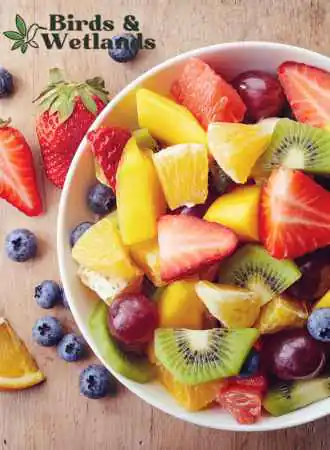
When feeding fruits to your ducks, it is essential to prepare them properly to ensure their safety and maximize the nutritional benefits. Here are some steps to follow when preparing fruits for ducks:
- Wash the fruits: Before offering fruits to your ducks, thoroughly wash them to remove any dirt, pesticides, or other contaminants that might be harmful to your ducks. Rinsing the fruits under running water and gently rubbing the surface should be sufficient to clean them.
- Remove any harmful parts: Some fruits contain parts that are toxic or hazardous to ducks, such as pits, seeds, or stems. Carefully remove these parts from the fruits before feeding them to your ducks. For instance, remove apple seeds and cherry pits, as they contain cyanide, which can be harmful to ducks when consumed in large quantities.
- Cut fruits into appropriate sizes: To make it easier for your ducks to consume the fruits and minimize the risk of choking, cut the fruits into small, manageable pieces. This is particularly important for fruits with a firmer texture, such as apples, pears, or melons.
- Remove peels, if necessary: While many fruits can be fed to ducks with their peels on, it might be beneficial to remove the peels from certain fruits, such as oranges or bananas, to make them easier for ducks to eat. However, ensure that you do not remove the peels from fruits like apples, as they contain essential nutrients and fiber.
- Offer fruits in moderation: Fruits should be offered as occasional treats, not as a staple in a duck’s diet. Too much fruit can lead to an imbalance in their nutrition and result in health issues. A small handful of fruits per duck a few times a week should suffice.
- Monitor your ducks’ preferences: Observe your ducks as they eat the fruits, and take note of their preferences. Some ducks may prefer certain fruits over others, and it is essential to cater to their preferences while still offering a variety of fruits for a balanced diet.
- Discard any uneaten fruit: After your ducks have finished eating, remove any uneaten fruit from their feeding area to prevent it from spoiling or attracting pests.
Potential Health Issues
While feeding ducks fruit is generally safe in moderation, there are potential health issues to consider. Here are a few things to keep in mind:
Thin Shelled Eggs
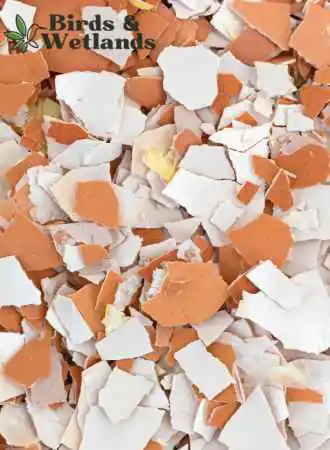
Ducks need calcium to produce strong eggshells. If they don’t get enough calcium, their eggs can have thin shells that are more likely to break. Feeding ducks too much fruit can interfere with their calcium absorption, leading to this problem.
Citrus fruits and spinach are particularly known to cause this issue, so it’s best to avoid feeding these to ducks in large quantities.
Angel Wing
Angel wing is a condition that affects the wings of backyard ducks and other birds, causing them to stick out from the body unnaturally. This can make it difficult for ducks to fly and can lead to other health problems. While the exact cause of angel wing is not fully understood, it is believed to be related to an imbalance of nutrients in the diet.
Feeding ducks bread and other high-carbohydrate foods can contribute to this problem. While fruit is generally a healthy addition to a duck’s diet, it should be fed in moderation to prevent angel wing. You can feed ducks whole wheat bread, brown rice, scrambled eggs, sweet potatoes and most fruits to vary up their diet when raising ducks.
Stomach Pain
Feeding ducks too much fruit can also lead to stomach pain and digestive issues. If ducks eat too much fruit at once, it can overwhelm their digestive system and cause discomfort.
Some fruits are high in sugar and can cause blood sugar spikes, which can also lead to stomach pain. To avoid this issue, it’s best to feed ducks small amounts of fruit at a time and to choose fruits that are lower in sugar.
Acid Reflux
Like humans, ducks can experience acid reflux if they eat too much acidic food. Fruits like citrus and pineapple are particularly high in acid and can cause this problem. Acid reflux can be uncomfortable for ducks and can lead to other health issues if left untreated. To prevent acid reflux, it’s best to avoid feeding ducks large amounts of acidic fruits.
Too Much Strain
Finally, feeding ducks too much fruit can lead to weight gain and other health problems associated with obesity. Ducks that are overweight are more likely to develop joint problems and other health issues that can shorten their lifespan.
To prevent this problem, it’s important to feed ducks a balanced diet that includes a variety of foods in moderation. Fruit can be a healthy addition to a duck’s diet, but it should be fed in moderation to prevent overfeeding and weight gain.
Best Overall Duck Feeder -FeatherEase Automatic Chicken Waterer & Feeder
Simplify Your Poultry Care with One Smart Solution!
Enhance your poultry care with the FeatherEase Automatic Chicken Waterer & Feeder, a convenient and efficient solution designed to keep your ducks and chickens well-fed and hydrated.

Pros
- Simplify your poultry care routine: Dual-function design combines an automatic waterer and feeder in one convenient unit.
- Save time and effort: Large feeder and waterer capacities reduce the need for frequent refill.
- Save money: Innovative no-waste feeding system minimizes feed spillage and waste.
- Long lasting: Food-grade, BPA-free materials ensure the safety and health of your poultry, while the durable constructio.
- Easy-to-assemble and maintain design simplifies the process of keeping your poultry hydrated and well-fed.
Cons
- Users with hard water may experience difficulty in separating the inner cup from the main cup of the waterer due to mineral buildup.
- The feeder’s holes may be too large for some users, allowing chickens to scatter food out, which could result in waste.
- The waterer may not function effectively in colder climates, requiring alternative solutions during the winter months.
While fruit can be a healthy addition to a duck’s diet, it’s important to feed it in moderation to prevent potential health issues like thin shelled eggs, angel wing, stomach pain, acid reflux, and obesity. By choosing the right fruits and feeding them in appropriate amounts, you can help keep your ducks healthy and happy.
FAQs on What Fruits Ducks Can Eat
Can ducks eat strawberries?
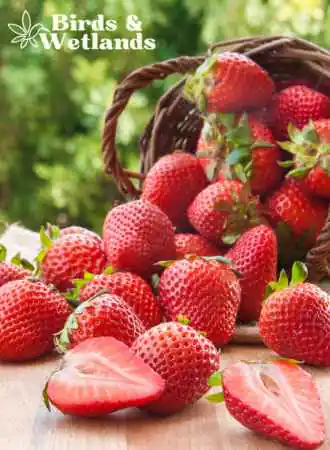
Yes, ducks can eat strawberries. Strawberries are a healthy treat for ducks, as they are high in antioxidants, vitamins, and fiber.
Can Ducklings Eat Grapes?
Ducklings can eat grapes, but it is important to cut the grapes into small, bite-sized pieces to avoid choking hazards. Grapes can be a healthy and nutritious treat for ducklings, providing vitamins and minerals. However, they should be fed fruit as an occasional treat and pit fruits should be avoided. They should not replace a balanced duckling’s diet specifically formulated for ducklings.
Do wild ducks eat fruit?
Yes, most ducks do eat fruit as part of their varied diet. They tend to consume fruits that grow near water sources, such as berries, crabapples, and other small fruits.
Can Ducks Eat Chicken Feed?
Yes, ducks can eat chicken feed, but it is essential to ensure that it meets their specific nutritional needs. While ducks and chickens have similar dietary requirements, there are a few key differences. Ducks generally need more niacin (vitamin B3) than chickens, so supplementing their diet with brewer’s yeast or other niacin-rich foods is important.
Can ducks eat sunflower seeds?
Yes, ducks can eat sunflower seeds. These seeds provide a good source of protein and healthy fats, making them a nutritious treat for your ducks. However, sunflower seeds should be fed in moderation, as they are high in calories and should not replace a duck’s regular diet. Ensure they also have plenty of fresh water and remember they can eat small fish, oats and other grains for a veried diet.
Are there any fruits ducks should avoid?
While most fruits are safe for ducks, it’s essential to avoid feeding them avocado, as it can be toxic to ducks and other waterfowl. Additionally, avoid feeding ducks dried beans or potato chips, as these are not suitable for their diet as well as foods from the nightshade family.
Can ducks eat lettuce?
Ducks can eat lettuce, including romaine lettuce and iceberg lettuce and other vegetables. However, keep in mind that iceberg lettuce has little nutritional value, so opt for romaine or other leafy greens when possible for more beneficial nutrients. Cut grass can also be a good addition to a duck’s diet.
What fruits can ducks eat?
Ducks love fruits such as watermelon rind, and seeded fruits like apples and pears. Other fruits that are safe for ducks include berries, grapes, and cherries (without the pits). When feeding fruit to ducks, it’s essential to remove any cherry pits or pit fruits, as they can be harmful. Adding brewer’s yeast is an excellent treat and will provide them with more nutrients.

